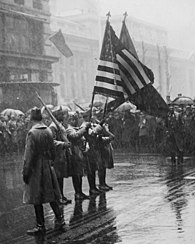|
Fitz Lee (Medal of Honor)
Fitz Lee (June 1866 – September 14, 1899) was a Buffalo Soldier in the United States Army and a recipient of America's highest military decoration—the Medal of Honor—for his actions at the Battle of Tayacoba in the Spanish–American War. Lee and three of his fellow Buffalo Soldiers were the last black servicemen to be presented the Medal of Honor for more than half a century. BiographyLee joined the Army from Philadelphia, Pennsylvania in December 1889,[1] and by June 30, 1898, he was serving as a private in Troop M of the 10th Cavalry Regiment. On that day, American forces aboard the Florida near Trinidad, Cuba, dispatched a landing party to provide reconnaissance on Spanish outposts in the area. The party was discovered by Spanish scouts and came under heavy fire; their boats were sunk by enemy cannon fire, leaving them stranded on shore. The men aboard the Florida launched several rescue attempts; the first four were forced to retreat under heavy fire. The fifth attempt, by Lee and three other privates of the 10th Cavalry (Dennis Bell, William H. Thompkins and George H. Wanton) under the command of Lieutenant Ahern, was launched at night and successfully found and rescued the surviving members of the landing party. One year later, on June 23, 1899, four of the rescuers were awarded the Medal of Honor for their actions in what had come to be known as the Battle of Tayacoba. Fitz Lee died less than three months after receiving the medal. He was buried in Fort Leavenworth National Cemetery, Leavenworth County, Kansas. Medal of Honor citationPrivate Lee's official Medal of Honor citation reads:
See also
References
External links
|
||||||||||||||||||||||
